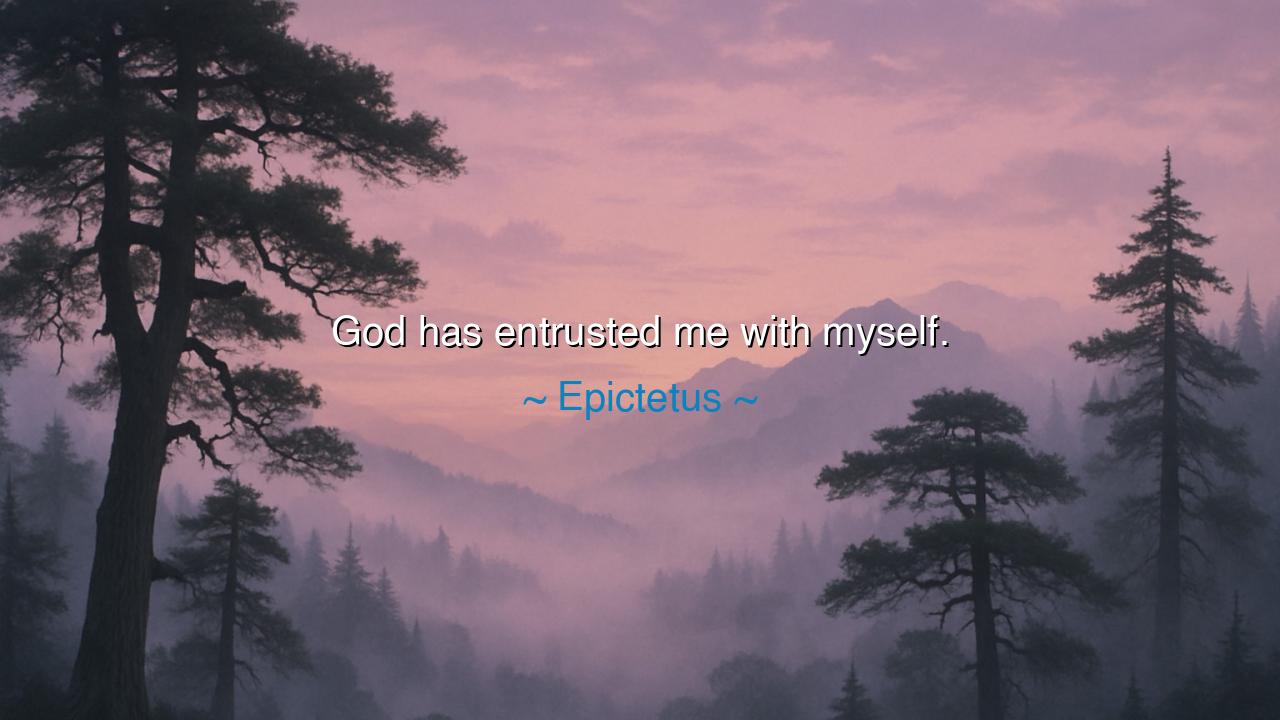
God has entrusted me with myself.






“God has entrusted me with myself.” So declared Epictetus, the humble yet mighty philosopher of the Stoic school, who was born a slave but rose to become a teacher of kings. In this brief and radiant sentence lies a truth that has guided wise souls for centuries: that every human being carries within them a sacred responsibility—the guardianship of their own soul. It is not wealth, nor power, nor destiny that has been entrusted to us above all else, but our selves—our thoughts, our actions, our will. All else in life may be taken away; but the inner man, the soul that chooses how to live, belongs wholly to us, and to God who has placed it in our care.
The origin of this saying rests in the Stoic belief that though we cannot control the external world—fate, fortune, or the will of others—we can master the inner realm of the spirit. Epictetus, who was once bound by chains, discovered a freedom greater than any emperor could command: the freedom of the mind. To say that God has entrusted me with myself is to affirm that life itself is a divine stewardship. The Creator has given each soul a fragment of eternity, and says to it, “Guard this flame; make of it something worthy of Me.” It is not an easy trust, but it is the most sacred one—more binding than any law, more precious than any gift.
To be “entrusted” by God means to be watched and guided but not controlled. Like a father who gives his son a lamp for the night, He grants us the light of reason and the power of choice, yet leaves it to us to keep the flame alive. Epictetus saw this clearly: that we are not masters of the universe, but stewards of our own hearts. We cannot command the storms, but we can command our response. We cannot stop pain, but we can choose how to bear it. This is the essence of freedom—the liberty of the soul to remain pure amid corruption, calm amid chaos, steadfast amid loss.
Consider the life of Viktor Frankl, the Jewish psychiatrist imprisoned in the Nazi concentration camps centuries after Epictetus. Like the Stoic philosopher, Frankl found that even in chains, a man can be free. Everything was taken from him—family, dignity, health—but one thing remained: the ability to choose his response. He later wrote that “everything can be taken from a man but one thing: the last of the human freedoms—to choose one’s attitude in any given set of circumstances.” In that truth, Frankl and Epictetus meet across time. Both realized that God has entrusted man with himself, even in the darkest night. That trust is the measure of human dignity.
The weight of this truth is both solemn and glorious. It means that no one else can live your life for you, nor ruin it without your consent. You are the keeper of your own mind, the sculptor of your own soul. You cannot blame fate for the shape of your character; you cannot curse the world for your own choices. God has placed your spirit in your hands, and asks only that you govern it wisely—with courage, justice, and humility. The wise man, said Epictetus, does not seek to control what is not his, but perfects what is his alone: the mastery of himself.
This saying also calls us to accountability. For if God has entrusted us with ourselves, then He will ask what we have done with that trust. Did we let our passions rule us? Did we waste the mind given to us on petty things? Did we feed the soul with truth and virtue, or starve it with vanity and fear? The soul is not a toy—it is the divine image within us, placed in our care. To neglect it is betrayal; to cultivate it is worship. Every moment of self-restraint, every act of kindness, every thought lifted toward the good is a way of saying, “I honor the trust You have given me.”
Therefore, my child, remember this above all things: you are not the property of the world, but of God, and He has entrusted you with yourself. Guard your heart as a temple, discipline your mind as a warrior, and nurture your soul as a garden. Do not wait for others to define you or save you—for that power is already yours, sealed in the covenant between Creator and creature. When anger tempts you, remember: you are its master, not its slave. When despair whispers, answer: “I am entrusted, not forsaken.”
For the one who understands this quote lives no longer as a victim of chance, but as a partner of Providence. God has entrusted you with yourself—and when you honor that trust, when you live with integrity, courage, and purpose, you fulfill the highest duty of man: to become, by choice, what the Divine already intended you to be.






AAdministratorAdministrator
Welcome, honored guests. Please leave a comment, we will respond soon